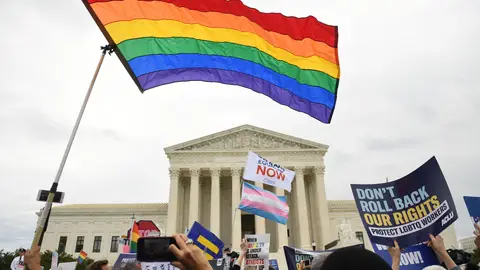SCOTUS Is Debating LGBTQ Protections on a National Scale. But What About State Laws?

By Jeff Taylor and Kate Sosin
It’s too soon to give hard numbers, and Annise Parker wouldn’t even if she could. But no matter what happens at the Supreme Court today, October 8—where the justices are hearing arguments for and against interpreting existing federal law against sex discrimination to include LGBTQ people—the president of the LGBTQ Victory Fund says her strategy won’t change.
More than 720 out LGBTQ candidates pursued office in 2018, and more than 150 claimed victory in what the press dubbed a “Rainbow Tsunami.”
“2020 is going to be even more,” predicts Parker, who says LGBTQ candidates in state and local races have already kicked off their campaigns at a pace that signals unprecedented enthusiasm. “Success breeds success.”
Those early predictions from the Victory Fund could have major implications for LGBTQ Americans in states that lack nondiscrimination protections currently being argued in three cases before the Supreme Court.
More than half the nation’s 7.1 million LGBTQ workers live in states without laws protecting them from discrimination, according to UCLA's LGBTQ think tank the Williams Institute.
Five federal circuits, covering 23 states, have ruled that discrimination based on gender identity constitutes illegal sex discrimination under Title VII of the Civil Rights Act of 1964. Additionally, two circuits, covering six states, have ruled similarly on cases involving sexual orientation discrimination, according to the think tank Movement Advancement Project (MAP).
If the Court rules in favor of LGBTQ employees, more than 4 million workers nationwide will gain new federal protections. But if the Court decides that Title VII doesn’t apply to LGBTQ workers, more than half the country will be left without those rights. Those who do have them will be relying on a patchwork of state and municipal laws banning anti-LGBTQ discrimination.
Only 21 states, the District of Columbia, and two territories, Guam and Puerto Rico, have laws banning bias in the workplace based on both sexual orientation and gender identity.
Another two states, Pennsylvania and Michigan, interpret state law to include sexual orientation and gender identity, and Wisconsin has a state law protecting residents on the basis of sexual orientation only.
Additionally, more than 280 city and county ordinances are also on the books across the country banning anti-LGBTQ discrimination in the workplace.
Greg Nevins, senior counsel and employment fairness project director at Lambda Legal, uses the example of a person fired in Florida. While the Sunshine State doesn't have LGBTQ anti-discrimination protections on the books, it does have a ruling that interprets Title VII to cover LGBTQ people. In a world where that ruling is considered moot, the legal strategy changes.
“The first question out of my mouth, if I were on the other end of that call in Florida is, 'Where are you?'” Nevins explains. “Because Florida has local ordinances that limit discrimination and, and some of them are actually good and that's not always the case with local ordinances.”
That’s where 2020 becomes so critical, according to experts.
"Where we are right now is, we have broad public support for nondiscrimination, and yet a majority of states lack explicit protection through state laws," Naomi Goldberg, of MAP, tells NewNowNext.
"So, the way I see it, is that if the Supreme Court rules that Title VII does not prohibit discrimination based on sexual orientation and gender identity, we're really left with two potential places for action. One is in the states, and the other is at the federal level, actually updating the federal nondiscrimination laws to prohibit discrimination based on sexual orientation and gender identity. I think we're going to see both of those things happen."
Goldberg says she believes most Americans are under the impression that federal civil rights law protects LGBTQ people—and that this case could bring about an opportunity for increased awareness and action.
The House passed the Equality Act earlier this year, which would add federal protections for LGBTQ people, but it is opposed by President Donald Trump, and has not been brought up for a vote in the Senate.
"Even if the Supreme Court affirms that Title VII does protect LGBT workers, there are other areas of federal law where LGBT people are not protected, where the Equality Act would still be helpful," Goldberg says.
"We see a potential kind of domino effect of this court ruling [if the Court affirms Title VII protects LGBT people], where affirmatively we could then say, ‘Okay, sex discrimination in housing includes LGBT people, sex discrimination in health care that currently exist under federal law, that includes LGBT people. But we don't actually have a federal law that prohibit sex discrimination in places of public accommodation.' Those are places like restaurants or retail shops. And so, the Equality Act would be very important from that perspective to have affirmative, explicit protections for LGBT people in all our areas of federal law.”
“It matters very much what happens at the statehouse level,” Parker adds. “What we see over and over again is the importance of electing a critical mass of legislators.”
The 26 states without protections appear reluctant to put them on the books. Still, one out LGBTQ lawmaker can have a profound impact in such states.
“Even with just one, it's a lot harder if I was to discriminate against somebody If you have to look them in the eye and you may need their vote the next time on a bill next time you’re out,” notes Parker. “I think people often think about LGBTQ representation and they think about big urban areas and blue states. We live everywhere, and our candidates run everywhere. And, well, I started by saying a lot of them were energized by national issues. You don't win on national issues. You win on local issues."





